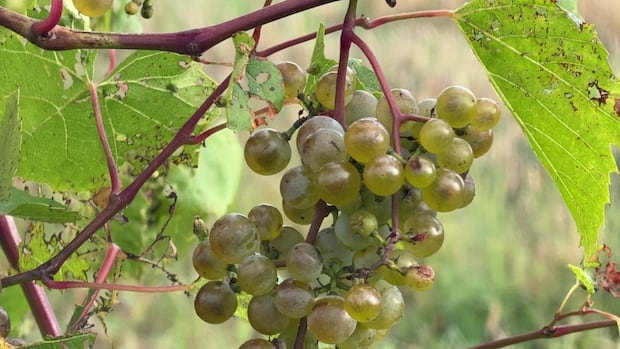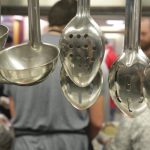OttawaThe hot, dry summer in eastern Ontario has been good for many local wine grapes. But after a cold snap in mid-September, some local vineyards found they lost a significant portion of their crop.’You’ll be more likely to make vinegar from it than wine’, one winemaker says of rotten grapesGabrielle Huston · CBC News · Posted: Oct 06, 2025 4:00 AM EDT | Last Updated: 3 hours agoWhen grape vines experience a cold snap, they stop photosynthesizing and the grapes will stay at their current ripeness until they rot or are harvested, explains winemaker Graham Fish. (Giacomo Panico/CBC)Just a few weeks ago, the Domaine Perrault Winery in Navan was eagerly anticipating its harvest.”We were expecting a sizeable harvest this year,” said winemaker Graham Fish. “We were pretty excited.” Hot, dry weather like eastern Ontario has experienced this year is good for wine grapes, so each vine produced more grapes than usual. The field had a “lot of potential,” he said.”Grapes tend to taste better when the plant struggles a little bit,” explained Fish. “It forces [roots] down and they pull different nutrients out of the deeper soils.”But their hopes were crushed on the nights of Sept. 19 and 20, when the winery was hit by a cold snap, Fish said. Domaine Perrault and other local vineyards found they had lost, or were forced to recover, much of their valuable crop.Graham Fish said for a couple days the vineyard had ‘up to 10 [volunteers] working in the vineyard, and that was a huge, huge help’ to recover the grapes affected by frost. (Giacomo Panico/CBC)’Suffer the loss and hope’At Domaine Perrault, they’d already begun harvesting before the cold weather struck.The grapes were ready, but they’d planned to let them continue ripening as they slowly harvested. Once frost sets in, the vines stop photosynthesizing.”Once you get a frost, usually you have about two weeks, give or take, to get whatever fruit is out there off,” Fish said. “[After that] there’s no point in trying to make wine from it. You’ll be more likely to make vinegar from it than wine.” The winery was able to harvest 70 per cent of the grapes, which Fish said is “standard,” but only happened thanks to volunteers who pitched in for a rushed harvest.But at KIN Vineyards near Carp, Ont., they hadn’t begun harvesting yet, said owner Lorraine Mastersmith.Their block of Chardonnay vines were struggling to grow after bad conditions the previous year, including heavy rain and an infestation of Japanese beetles, she explained. They couldn’t survive the mid-September cold snap.’In the six years that we’ve owned [KIN Vineyards], that’s the first time we’ve had frost that early in September,’ Lorraine Mastersmith says. (Rachelle Elsiufi /CBC)Mastersmith estimated they lost more than two out of five acres of the Chardonnay grapes, around 40 per cent.”If you did the math on what it’s costing and the level of production that we’re getting off the vineyard this year … in order to recoup those costs, we’d have to charge close to $200 a bottle, which we can’t do,” she said.”You just suffer the loss and hope that next year we’ll have a better crop.”Changing and varied climateNot all vineyards in eastern Ontario suffered the effects of cold weather, like the Vignoble Clos du Vully, southeast of Navan.Owner Jan-Daniel Etter said he was spared frost because the vineyard limits the risk of cold weather by planting their vines at a higher elevation, above where frost tends to settle.Etter, Mastersmith and Fish all said they noticed a gradual change in the climate over recent years, a change they said has generally been a boon.”I actually think climate change is helping us,” Mastersmith said. “Our growing season is a little bit longer … look at the weather this weekend, it’s incredible and that’s not typical, but it really is good for growing grapes.”Workers at KIN Vineyards harvest grapes in October 2016. (Hallie Cotnam/CBC)But other elements of the changing climate are less beneficial.Etter noted the problems caused by the invasive Japanese beetle, a species he said wasn’t present in this area five years ago.And Fish said in addition to the warmer fall weather, which he said lets his vines better prepare for winter, he’s also noticed more severe cold snaps.But despite this year’s frost, Fish said he’s still excited to make wine with the grapes they did harvest.”I think if you dwell on it too much, then you’re sort of setting yourself up to be disappointed more often than not,” he said. “You got to just kind of keep moving with what you got and just look at the potential that’s still there.”ABOUT THE AUTHORGabrielle is an Ottawa-based journalist with eclectic interests. She’s spoken to video game developers, city councillors, neuroscientists and small business owners alike. Reach out to her for any reason at gabrielle.huston@cbc.ca.Follow Gabrielle on BlueskyFollow Gabrielle on Instagram
Wednesday, 8 Oct 2025
Canada – The Illusion
Search
Have an existing account?
Sign In
© 2022 Foxiz News Network. Ruby Design Company. All Rights Reserved.
You May also Like
- More News:
- history
- Standing Bear Network
- John Gonzalez
- ᐊᓂᓈᐯᐃᐧᐣ aninâpêwin — Truth
- Creation
- Beneath the Water
- Olympic gold medal
- Jim Thorpe
- type O blood
- the bringer of life
- Raven
- Wás’agi
- NoiseCat
- 'Sugarcane'
- ᐅᑳᐤ okâw — We remember
- ᑲᓂᐸᐏᐟ ᒪᐢᑿ
- This is what it means to be human.
- Nokoma
- Kanipawit Maskwa
- Native American names











